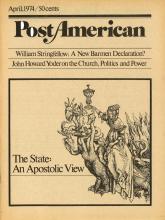Robert D. Linder and Richard V. Pierard, Politics: A Case for Christian Action, InterVarsity Press, 1973, 155 pp.
Wesley C. Pippert, Memo for 1976, InterVarsity Press, 1974, 107 pp.
Three books dealing with politics and discipleship have been recently released by authors who have come to be identified with the resurgent interest in social affairs among evangelicals. The writers bring a variety of perspectives to their subject. Linder and Pierard, history professors on state university campuses, have both been involved in politics on the local level, one as a Republican, the other as a Democrat. Mouw teaches philosophy on a Christian college campus. Pippert is with UPI in Washington and was one of their reporters covering the Watergate hearings.
Mouw’s book stands out first of all became of its striking title. Politics and evangelism are not usually directly tied together, even by those with an active Christian social conscience. But Mouw is not attempting to play games with words. He has deliberately chosen to use these terms, and uses them carefully. For Mouw, evangelism is "… concerned to show forth the full glories of the Kingdom of God among men, with an eye to the day when that Kingdom will reign over the entire earth.” (p. 76, see I Peter 2:9) and is “concerned with the proclamation a demonstration of the full gospel, and with bringing that gospel into confrontation with the pervasive power of sin.” With this understanding of evangelism in mind, political evangelism is one aspect of the overall evangelistic task of the church:
Read the Full Article

